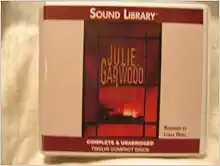
Description
From Publishers Weekly Set in 13th-century England and Scotland, this rollicking adventure is among Garwood's ( The Bride ) most enjoyable. The news that her despicable husband is dead has left beautiful 16-year-old Lady Johanna both wealthy and available. Wicked King John wants to marry her to one of his henchmen, but her beloved foster brother convinces the powerful highland laird Gabriel MacBain to put aside his natural repugnance for all things English and wed the girl. Emotionally scarred by her first marriage, Johanna is intimidated both by her strange surroundings and by the outsized, gruff laird; but with the help of an eccentric old soldier and MacBain's illegitimate son, Johanna learns to hold her own with the soldiers, their wives and her new husband. Then an unwelcome surprise tests her newfound courage. Garwood endows the novel with a first-rate setting, a splendid supporting cast and witty dialogue that more than offsets the rote predictability of Johanna's great beauty and MacBain's forceful charisma. Copyright 1993 Reed Business Information, Inc. From School Library Journal YA-An entertaining story with many amusing elements. In 1206, a hastily arranged marriage unites Johanna, recent widow, with MacBain, a Scottish laird. The woman learns new customs, creates some problems but solves others, and falls in love with her husband in this turbulent time of mixed loyalties. The characters are believable-they are real people with a variety of emotions, strong allegiances at home and on the battlefield, but are tender and caring individuals too. Sufficient details of the period provide adequate background to make the people and times come alive, but the story doesn't become bogged down with these technicalities. The abundant dialogue, humorous incidents, and quick pace make this a good choice for anyone looking for light historical romance. Claudia Moore, W.T. Woodson High School, Fairfax, VA Copyright 1994 Reed Business Information, Inc. From Library Journal When Lady Johanna is widowed at the age of 16, she is determined never to marry again and become the victim of abuse at the hands of a husband. King John of England, suspecting that Johanna knows a secret that could destroy him, has chosen another brutal baron for her next husband. Johanna's foster brother finds her a suitable hero in the form of Scottish laird Gabriel McBain, who weds Johanna in order to control the land she brings as a dowry. Johanna must not only adjust to life in the Highlands, but she must also win the respect of McBain and his recently unified clan. He is an arrogant hero who seems to be always arguing and shouting, habits that begin to wear on the reader if not the heroine. Johanna is a woman with a 20th-century sense of independence and self-worth that plays surprisingly well in the 13th-century setting. Romance fans will be demanding this first hardcover from the best-selling paperback author of The Gift (Pocket, 1991). - Kimberly Martin, Washington Univ. Law Lib., St. Louis Copyright 1993 Reed Business Information, Inc. From Kirkus Reviews A hardcover debut by a writer well known in paperback romance klatches confronts the question of the place of women in 13th- century England and Scotland--i.e., where they stand in God's love, and whether their husbands should beat them. Heroine Lady Johanna--an abused and battered wife, wed to Baron Raulf, a vassal of King John of England--is pleased when the news comes that her husband's dead. But her troubles haven't ended, since the king suspects she knows he murdered his nephew in order to consolidate his place on the throne. So Johanna's brother takes her off to the Scottish Highlands for safekeeping--and effectively gives her to Gabriel MacBain, the laird to two squalling clans, the MacBain and the Maclaurin. It's cold, dank, and uncomfortable up there among the crags, and at first MacBain seems an uncouth bear of a man. Still, Johanna survives--he's not only handsome but great in bed. What's more, he doesn't hit her. In fact, he turns out to be downright progressive where women are concerned--one part MacBeth, three parts Iron John. There's a little will testing between these two, of course, lots of time between the sheets, and a shake of eleventh-hour dramatics having to do with the return of Baron Raulf. But, in the end, all turns out well, and women are redeemed, respected, equal to men--in the domain of the MacBain circa 1200, if not now. Anachronistic? Good heavens, yes. But the characters are warm, gushy, highly hormonal--and thus likely to please Garwood's paperback fans. -- Copyright ©1993, Kirkus Associates, LP. All rights reserved. Read more
Features & Highlights
- Lady Johanna, a widow in thirteenth-century England, is thrust into another marriage of convenience, but finds herself drawn to her gruff yet gentle husband





